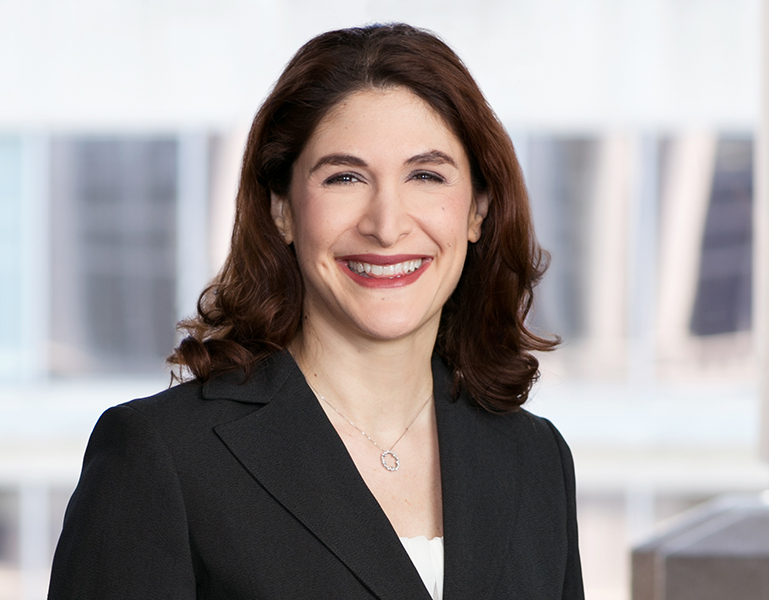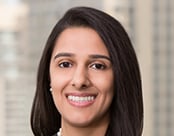Highlights from 2022 ALI-CLE Accountants’ Liability Conference
The ALI-CLE Accountants’ Liability Conference was held in Washington D.C. on June 9 and 10, 2022 following a two-year hiatus due to the global pandemic. The conference was co-hosted by Junaid A. Zubairi, Chair of Vedder Price’s Government Investigations and White Collar Defense Group, and Veronica Callahan of Arnold & Porter LLP. The conference, now in its third decade as an industry staple, featured a lineup of speakers ranging from in-house counsel, outside counsel, consultants, and regulators from the Securities and Exchange Commission (“SEC” or the “Commission”) and the Public Accounting Oversight Board (“PCAOB”).
The conference began with a “fireside chat” featuring Gurbir Grewal (Director, SEC Division of Enforcement) and Paul Munter (Acting Chief Accountant, SEC Office of the Chief Accountant), who discussed recent enforcement initiatives and issues of importance to the Commission.
According to Director Grewal, the SEC continues to see a steady stream of gatekeeper liability and auditing cases, including two recent enforcement actions involving accounting firms and/or accounting professionals that were brought within the past week. He noted that these cases demonstrate the SEC’s willingness to pursue all available sanctions and remedies, including ordering an accounting firm not to accept any new audit clients, in addition to more standard remedies such as an independent compliance consultant, censure, or civil money penalty. As an aside, Director Grewal also noted that the Commission will seek remedies, such as bars against attorneys based on misconduct and claw backs of performance-based executive compensation under Section 304 of the Sarbanes-Oxley Act, as part of broader efforts to enhance the Commission’s enforcement program.
Director Grewal also addressed what he deemed troubling practices by counsel representing individuals and entities in SEC investigations. This includes a perceived rise in attorneys “coaching” witnesses, “slow rolling” document production, making overly aggressive privilege assertions, and even threatening the Staff.
Mr. Munter addressed his recent June 8, 2022 statement entitled “The Critical Importance of the General Standard of Auditor Independence and an Ethical Culture for the Accounting Profession.” He explained that the SEC has brought a number of enforcement actions under Rule 2-01(b)—the auditing standard grounded in an auditor’s objectivity and impartiality —and that he wanted to reinforce an independent mindset rather than merely viewing an independence assessment as a checklist under Rule 2-01(c).
According to both Director Grewal and Mr. Munter, the SEC continues to be focused on the digital asset space. The SEC has seen a growing concern about fraud in this area and related harm to investors. Despite criticism surrounding the Commission’s efforts to regulate the digital asset space, Mr. Munter believes the SEC should play a role in safeguarding investors. The Commission is working with other entities such as the Financial Accounting Standards Board to encourage and develop relevant accounting guidance.
Both Director Grewal and Mr. Munter discussed what they perceive as growing mistrust in large institutions and government. Director Grewal stated that the SEC is making an effort to move cases quickly in order to avoid unnecessary delay that could harm the public. Mr. Munter noted that accountants have to think about themselves as professionals and to view public responsibility as their “guiding star.”
In addition to comments from Director Grewal and Mr. Munter, the program also included panel discussions regarding: new accounting standards; strategic considerations in responding to government subpoenas; emerging issues such as accounting disclosures relating to the Ukraine/Russia conflict, regulatory expectations regarding separation between audit and consulting practices, SPACs, ESG regulations, and alternative practice structure; the PCAOB inspection program; key issues facing in-house counsel at accounting firms beyond the “Big Four”; restatement-related investigations and 10A investigations; current trends in accounting litigation, whistleblower considerations, SEC enforcement priorities and trends, expert testimony strategy, and trial considerations in accountant liability cases.
Key takeaways from these panel discussions include the following:
- 2022 PCAOB inspections will focus on the following areas: (1) the effects of COVID-19; (2) widespread supply chain disruptions; (3) rising costs, inflation and the rise of credit levels; (4) the great resignation; (5) initial public offerings (“IPOs”); (6) mergers and acquisitions; and (7) SPACs and De-SPACs. PCAOB’s targeted inspections will focus on IPOs, climate change, and centers of excellence.
- During inspections, the PCAOB consistently finds deficiencies relating to: (1) business combinations; (2) revenue and revenue recognition; (3) inventory; (4) internal controls and financial reporting; and (5) allowance for loan loss.
- Rule 2-06 is broader than AS 1215 and requires the preservation of documents whether they support an auditor’s final conclusions or contain information or data “relating to a significant matter” that is inconsistent with their final conclusions. To the extent there are relevant documents which were not preserved by the auditor but were produced by another party to the SEC, such as the issuer, that could be a potential “soft spot” and indicate a violation of Rule 2-06.
- Accounting firms wrestling with the emerging areas of ESG, SPACs, climate change, and cryptocurrency should proactively meet with the SEC’s Office of the Chief Accountant to consult about these topics and obtain guidance.
- SEC Office of Chief Accountant consultations related to digital assets have involved both non-unique issues that happen to involve digital assets (e.g., revenue recognition), and unique issues that are specific to digital assets (e.g., platform custody and crypto lending arrangements).
Vedder Thinking | Articles Highlights from 2022 ALI-CLE Accountants’ Liability Conference
Article
June 24, 2022
The ALI-CLE Accountants’ Liability Conference was held in Washington D.C. on June 9 and 10, 2022 following a two-year hiatus due to the global pandemic. The conference was co-hosted by Junaid A. Zubairi, Chair of Vedder Price’s Government Investigations and White Collar Defense Group, and Veronica Callahan of Arnold & Porter LLP. The conference, now in its third decade as an industry staple, featured a lineup of speakers ranging from in-house counsel, outside counsel, consultants, and regulators from the Securities and Exchange Commission (“SEC” or the “Commission”) and the Public Accounting Oversight Board (“PCAOB”).
The conference began with a “fireside chat” featuring Gurbir Grewal (Director, SEC Division of Enforcement) and Paul Munter (Acting Chief Accountant, SEC Office of the Chief Accountant), who discussed recent enforcement initiatives and issues of importance to the Commission.
According to Director Grewal, the SEC continues to see a steady stream of gatekeeper liability and auditing cases, including two recent enforcement actions involving accounting firms and/or accounting professionals that were brought within the past week. He noted that these cases demonstrate the SEC’s willingness to pursue all available sanctions and remedies, including ordering an accounting firm not to accept any new audit clients, in addition to more standard remedies such as an independent compliance consultant, censure, or civil money penalty. As an aside, Director Grewal also noted that the Commission will seek remedies, such as bars against attorneys based on misconduct and claw backs of performance-based executive compensation under Section 304 of the Sarbanes-Oxley Act, as part of broader efforts to enhance the Commission’s enforcement program.
Director Grewal also addressed what he deemed troubling practices by counsel representing individuals and entities in SEC investigations. This includes a perceived rise in attorneys “coaching” witnesses, “slow rolling” document production, making overly aggressive privilege assertions, and even threatening the Staff.
Mr. Munter addressed his recent June 8, 2022 statement entitled “The Critical Importance of the General Standard of Auditor Independence and an Ethical Culture for the Accounting Profession.” He explained that the SEC has brought a number of enforcement actions under Rule 2-01(b)—the auditing standard grounded in an auditor’s objectivity and impartiality —and that he wanted to reinforce an independent mindset rather than merely viewing an independence assessment as a checklist under Rule 2-01(c).
According to both Director Grewal and Mr. Munter, the SEC continues to be focused on the digital asset space. The SEC has seen a growing concern about fraud in this area and related harm to investors. Despite criticism surrounding the Commission’s efforts to regulate the digital asset space, Mr. Munter believes the SEC should play a role in safeguarding investors. The Commission is working with other entities such as the Financial Accounting Standards Board to encourage and develop relevant accounting guidance.
Both Director Grewal and Mr. Munter discussed what they perceive as growing mistrust in large institutions and government. Director Grewal stated that the SEC is making an effort to move cases quickly in order to avoid unnecessary delay that could harm the public. Mr. Munter noted that accountants have to think about themselves as professionals and to view public responsibility as their “guiding star.”
In addition to comments from Director Grewal and Mr. Munter, the program also included panel discussions regarding: new accounting standards; strategic considerations in responding to government subpoenas; emerging issues such as accounting disclosures relating to the Ukraine/Russia conflict, regulatory expectations regarding separation between audit and consulting practices, SPACs, ESG regulations, and alternative practice structure; the PCAOB inspection program; key issues facing in-house counsel at accounting firms beyond the “Big Four”; restatement-related investigations and 10A investigations; current trends in accounting litigation, whistleblower considerations, SEC enforcement priorities and trends, expert testimony strategy, and trial considerations in accountant liability cases.
Key takeaways from these panel discussions include the following:
- 2022 PCAOB inspections will focus on the following areas: (1) the effects of COVID-19; (2) widespread supply chain disruptions; (3) rising costs, inflation and the rise of credit levels; (4) the great resignation; (5) initial public offerings (“IPOs”); (6) mergers and acquisitions; and (7) SPACs and De-SPACs. PCAOB’s targeted inspections will focus on IPOs, climate change, and centers of excellence.
- During inspections, the PCAOB consistently finds deficiencies relating to: (1) business combinations; (2) revenue and revenue recognition; (3) inventory; (4) internal controls and financial reporting; and (5) allowance for loan loss.
- Rule 2-06 is broader than AS 1215 and requires the preservation of documents whether they support an auditor’s final conclusions or contain information or data “relating to a significant matter” that is inconsistent with their final conclusions. To the extent there are relevant documents which were not preserved by the auditor but were produced by another party to the SEC, such as the issuer, that could be a potential “soft spot” and indicate a violation of Rule 2-06.
- Accounting firms wrestling with the emerging areas of ESG, SPACs, climate change, and cryptocurrency should proactively meet with the SEC’s Office of the Chief Accountant to consult about these topics and obtain guidance.
- SEC Office of Chief Accountant consultations related to digital assets have involved both non-unique issues that happen to involve digital assets (e.g., revenue recognition), and unique issues that are specific to digital assets (e.g., platform custody and crypto lending arrangements).










